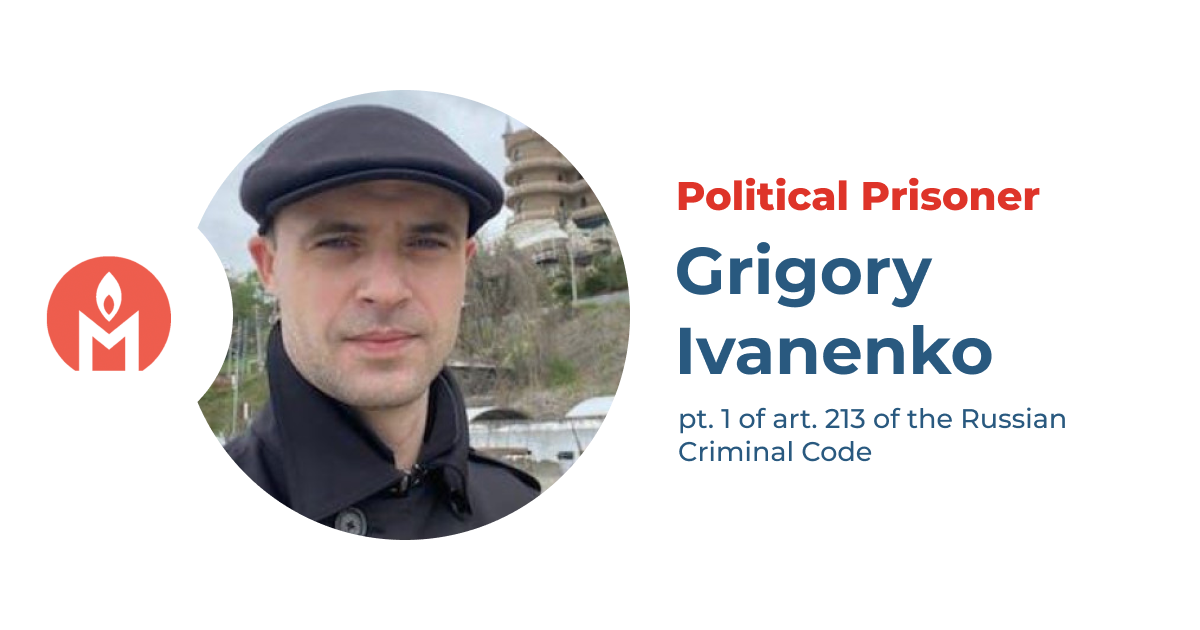Grigory Ivanenko is a political prisoner
A St. Petersburg resident was accused of hooliganism for distributing anti-Putin leaflets and sent to a psychiatric hospital
The ‘Political Prisoners. Memorial’ human rights project, in accordance with international standards, considers Grigory Ivanenko a political prisoner. Ivanenko was prosecuted on a charge of hooliganism motivated by political hatred for distributing leaflets featuring an image of a ‘dangerous criminal’ resembling Vladimir Putin. Ivanenko’s criminal prosecution and subsequent committal to a psychiatric hospital violated his rights to freedom of expression and a fair trial. We demand the release of Grigory Ivanenko from the psychiatric hospital and that all criminal charges against him be dropped.

What were the charges against Grigory Ivanenko?
According to the investigative authorities, on 29 May 2024, Grigory Ivanenko stuck leaflets on the walls of one of the military recruitment offices in St. Petersburg. The leaflets depicted a person in prison clothing who the police believed resembled Vladimir Putin. The leaflet stated that a ‘dangerous state criminal’ was wanted, listing his distinctive features: ‘a pompous dwarf, loud-mouthed, vengeful, extremely disdainful of the opinions of others. Known by the nicknames: VVP, the Toilet Gravedigger, Kabaev, Alpha Male, The Great Poo, Botox.’
On 31 May 2024, Grigory Ivanenko was arrested on charges of hooliganism motivated by political hatred (Article 213, Part 1, of the Russian Criminal Code). On 1 June, he was remanded in custody.
On 10 September 2024, a psychiatric examination concluded that Ivanenko ‘suffers from a chronic mental disorder in the form of chronic delusional disorder.’ In October, the court ordered his committal to a psychiatric hospital for the duration of the pre-trial investigation.
Why do we consider Grigory Ivanenko a political prisoner?
The charge of hooliganism contains elements of legal uncertainty and is often used against individuals who disagree with the policies of the Russian government.
Furthermore, the motive of ‘political hatred’ should only be considered when acts of violence are involved. Distributing and posting leaflets critical of the authorities cannot be classified as hooliganism motivated by political hatred, as this constitutes a form of political criticism. Moreover, the leaflets do not explicitly mention that the image is of Vladimir Putin — this conclusion was drawn by the investigators themselves.
In our view, Ivanenko’s actions do not constitute any offence. He was merely exercising his constitutional right to freedom of expression.
The forensic assessment, which led to Ivanenko’s committal to a psychiatric hospital, refers to evidence of a mental disorder such as ‘active struggle for the restoration of allegedly violated justice’ and ‘litigious activity’. This also indicates the political nature of the prosecution.
Compulsory psychiatric treatment should only be ordered where the person’s actions pose a danger to society. Clearly, posting leaflets poses no such danger. We believe Ivanenko’s committal to a psychiatric hospital is an example of punitive psychiatry used against a dissenter.
A detailed description of Grigory Ivanenko’s case and of our position is available on our website.
Recognition of an individual as a political prisoner does not imply the ‘Political Prisoners. Memorial’ human rights project agrees with, or approves, their views, statements, or actions.
How can you help?
You can write to Grigory Ivanenko at the following address:
In Russian: 190121 г. Санкт-Петербург, Набережная р. Мойки, д. 126, СПБ ГКУЗ ПБ Святого Николая Чудотворца, Иваненко Григорию Анатольевичу 1985 г. р.
English translation: Grigory Anatolievich Ivanenko (born 1985), St. Nikolai Psychiatric Hospital, 126 Naberezhnaya reki Moyki, St. Petersburg, 190121, Russia.
Please note that letters in languages other than Russian are highly unlikely to reach the intended recipient.
You can donate to help all political prisoners in Russia.
